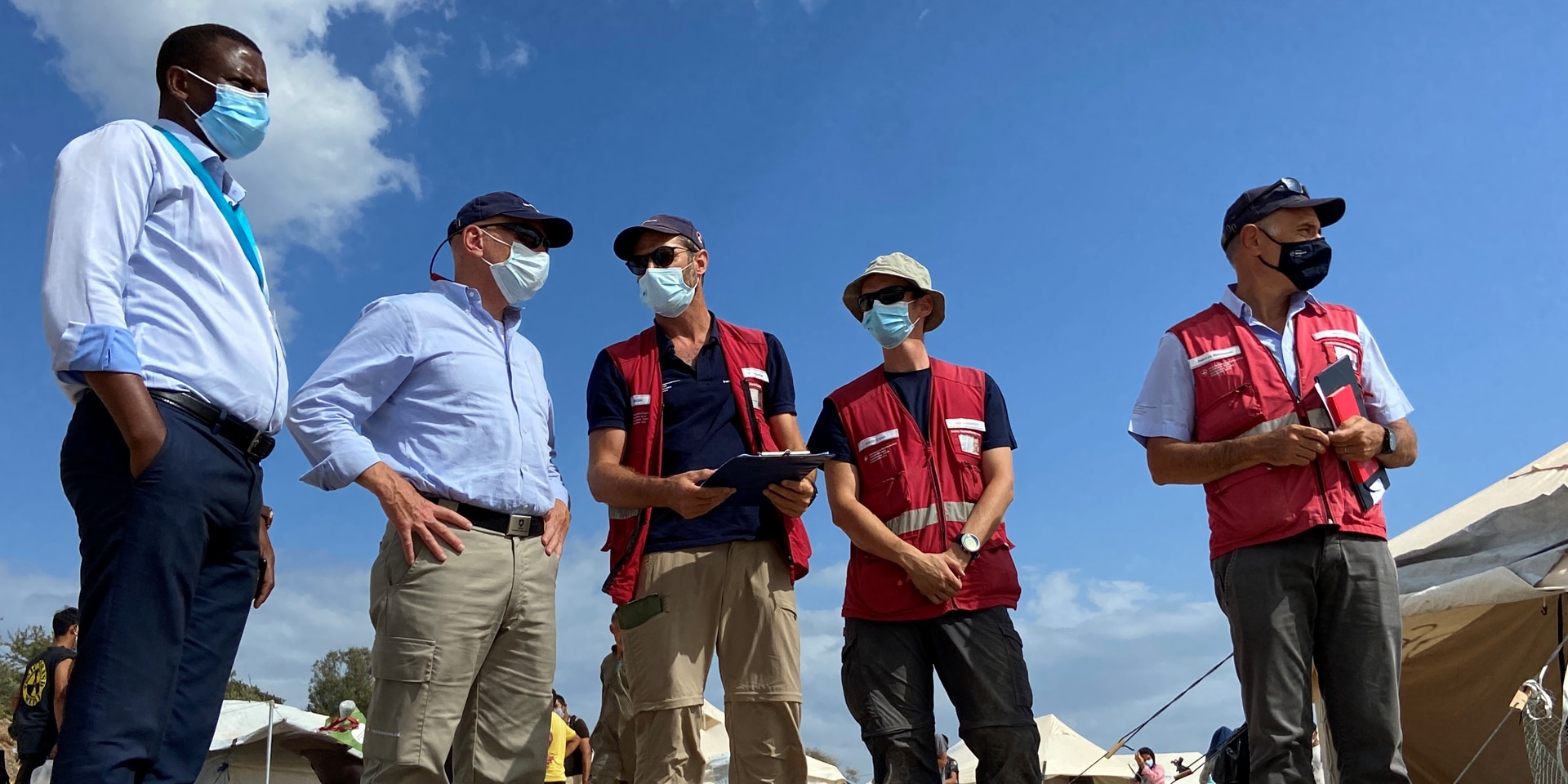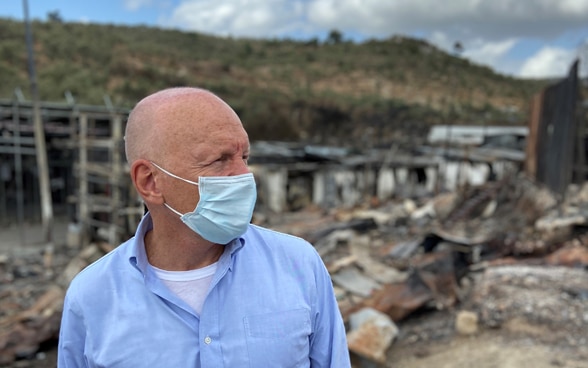Lesbos: "It's now time for actors on the ground to take over our projects"
Manuel Bessler, Deputy Director General of the Swiss Agency for Development and Cooperation (SDC), Delegate for Humanitarian Aid and Head of the Swiss Humanitarian Aid Unit, visited the Lesbos camp on Tuesday 29 September. He was keen to see the situation on the ground 20 days on from the fire that destroyed the transit camp for refugees and migrants on the Greek island. He also met other international actors to discuss the future of Swiss aid. In an interview he explains how Switzerland will end its emergency relief operation but will continue to provide medium- and long-term assistance.

Manuel Bessler (2nd from left), Switzerland's Delegate for Humanitarian Aid, visits the Lesbos camp with Swiss experts and the camp's deputy director, Spiros Habimama. © FDFA

Mr Bessler, you're currently visiting the new refugee camp on Lesbos. What's the situation on the ground?
I'm standing in the middle of the new Lesbos Registration and Identification Centre, and I can see a camp that is in the process of being built. There are already a lot of tents, but this small village still lacks the necessary infrastructure. Drinking water supply has been a major problem from the outset, and this is an area where Swiss Humanitarian Aid, with our expertise, was able to find an important niche. We've now built eight water supply facilities, which provide clean drinking water to the entire population of the camp.
Other major challenges are wastewater management and drainage for the camp. From mid-October, it can often rain for days at a time on Lesbos. A drainage system therefore needs to be installed so that the camp doesn't turn into a giant swamp, with all the tents under water. We're currently liaising with various actors and providing them with advice and support. It's clear that this camp isn't a permanent solution, and I'll be emphasising that point when I meet the relevant authorities in Athens on 30 September.
What have been the priorities for Switzerland's emergency relief mission?
The fire made 12,000 people homeless in just a few hours. They suddenly found themselves without food, a roof over their heads, sanitary facilities or clean drinking water. The aim was to help people as quickly as possible and to create decent living conditions. That was the core mission that we wanted to – and had to – achieve. We began by identifying the needs in collaboration with the Greek authorities and other humanitarian actors on the ground. It quickly transpired that ensuring a safe drinking water supply was a major challenge for the aid organisations on the ground and the Greek authorities.
As Swiss Humanitarian Aid has extensive expertise and knowledge with regard to drinking water, it made sense for us to get involved in this area. I've only been on the island for a few hours but I've already heard lots of positive feedback about our work. I think Switzerland has met this challenge successfully and has been able to deliver real added value.
Why is Switzerland ending its emergency relief now?
It's now time to hand over our work to the agencies and NGO that have been working on Lesbos for some time. For the past five years, the island has been on the front line when it comes to migration and there are now enough aid organisations here to carry on our work. We provided emergency relief, because that's what we specialise in. We lost no time deploying our expertise and skills on the ground and within 72 hours had set up a water system that is now providing the entire population of the camp with clean drinking water. We got the ball rolling and it's now time for actors on the ground to take over our project and help to deliver decent living conditions for the migrants, at least in the medium term.
In what form will Switzerland continue to provide support?
It's important that we don't just disappear overnight. The migration crisis isn't a new phenomenon on this island. Lesbos has faced these massive challenges for more than five years, and Switzerland now wants to make a more lasting contribution. That means providing not just emergency relief but also medium- and longer-term assistance.
We make staff available to our UN partner organisations and to NGO in the form of secondments. That means we dispatch accommodation and water experts to Lesbos on a longer-term basis to provide support and expertise to the organisations on the ground and the Greek authorities. A water engineer is currently there working for the United Nations International Children's Emergency Fund (UNICEF), and we are also making final preparations to second a civil engineer to the Office of the United Nations High Commissioner for Refugees (UNHCR) to assist with camp planning. We want to support our partners and the Greek authorities with this mammoth challenge, which is why Switzerland will continue to work on Lesbos after its emergency relief mission has ended.
